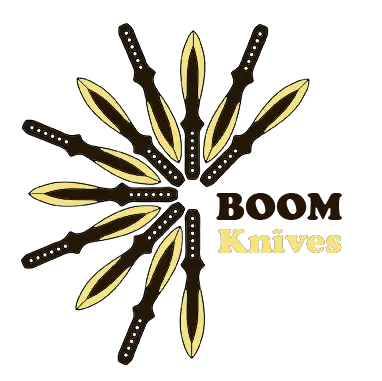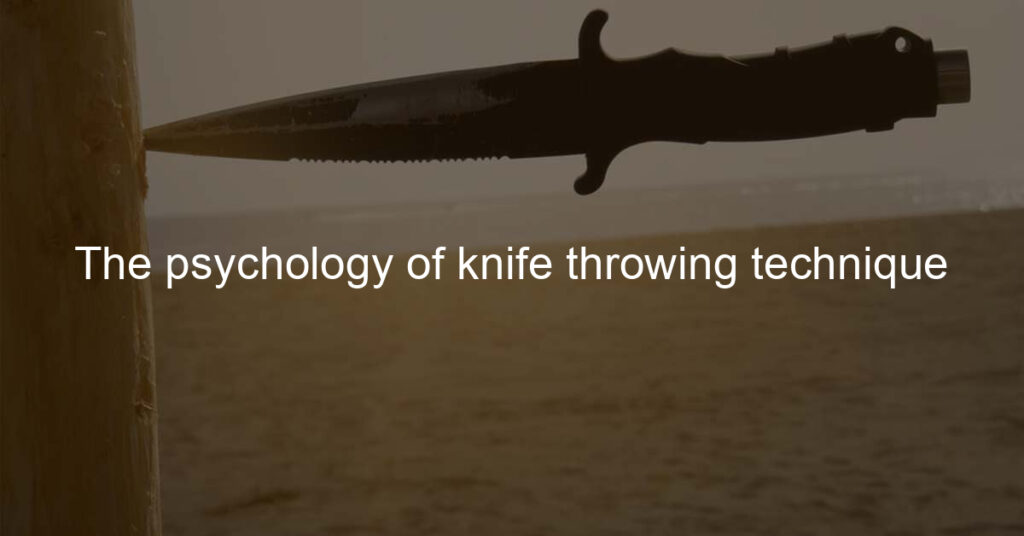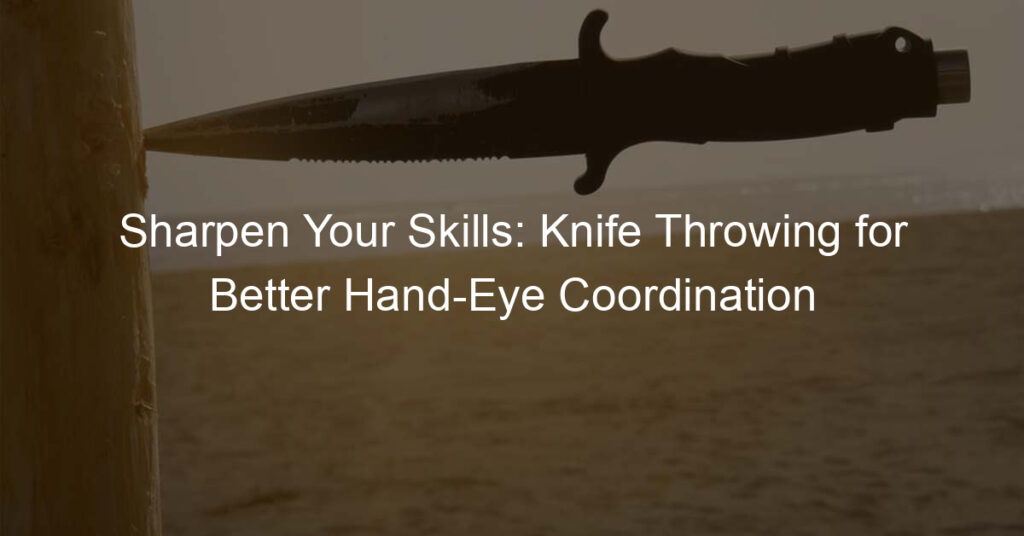Are you an avid knife thrower looking to take your technique up a notch? If so, understanding the psychological side of knife throwing can make all the difference in honing your skills and maximizing precision. From overcoming prep-performance anxiety to knowing when to make adjustments, this blog post will help you understand the psychology behind successful knife-throwing techniques — and how it could help you improve your results.
How does knife throwing affect the brain?
Knife throwing is more than just an activity – it’s an experience that encourages self-discovery and awareness. It provides physical, mental, and emotional challenges that can have a positive impact on your psyche.
As you practice your technique, your brain is constantly interpreting the commands you give it and making adjustments to keep you on target, making knife throwing both a physical and mental exercise.
Additionally, when you are successful in achieving a goal with the throw, the feelings of pride and accomplishment stimulate positive hormones in the brain that help reduce stress levels and increase confidence. With regular practice, knife throwing becomes an important part of a productive lifestyle.
What is the psychology behind knife throwing?
The idea of knife throwing brings to mind a sense of thrill and danger, yet the psychology behind it is quite fascinating. Knife throwing is an ancient practice, with evidence of its use going back to prehistoric times – even today, it’s still a popular form of entertainment and sport, though most often done as a hobby.
In psychological terms, there are several things at play when it comes to knife throwing: the need for precision and timing to ensure accuracy; the drive for progress out of a desire for betterment; and finally the challenge of mastering control to reach desired results.
Of course, this description doesn’t even begin to dive into the psychological elements related to recreation or competition-level throwing. Regardless, one thing is certain – it takes skill and knowledge to get good at knife-throwing!
Can knife throwing be therapeutic?
It may surprise you to know that knife-throwing can be quite therapeutic! This high-energy activity requires intense focus and concentration, perfect for those moments when your mind needs a break from the daily grind.
Not only is it a great way to build up hand-eye coordination, but in mastering the skill of knife throwing, you also burn off some stress and frustrations from the day. Each toss of the blade helps hone patience, strength, and precision which become important tools for controlling emotions.
As if all this wasn’t enough, practicing knife throwing can provide an amazing feeling of accomplishment each time a throw is perfected. So if you’re looking for an interesting way to relieve stress or just something different to try out with friends, why not give knife throwing a go?
How do you overcome your fear of knife-throwing?
Overcoming fear in knife throwing starts with preparation and technique. It can be helpful to form a mental plan before actually making the throw which can include visualizing the target accurately, mentally rehearsing the process, and walking yourself through each step of preparing for the throw.
Additionally, it’s important to pay attention to technique so that you feel confident in your ability to stay safe and land a successful throw. This includes ensuring your stance is sturdy, your shoulders are relaxed, and you have a proper grip on the knife handle for stability.
Consistent practice is key for any skill, but especially one like knife throwing that could cause fear if things go awry. So focus on building confidence by mastering technique and trusting your process!
What are the mental benefits of knife throwing?
Knife throwing is enjoying a resurgence in popularity as people realize it is not only fun and exciting, but that there are also mental benefits to be had from regular practice.
Throwing accurately requires concentration and focus which can lead to improved cognitive abilities. Knife throwing can also aid in building muscle memory, allowing its practitioners to quickly and intuitively react to any situation they may encounter.
The combination of these mental benefits creates a host of improvements in other areas of life, such as the ability to think on one’s feet, better decision-making skills, and the ability to remain calm and composed under pressure.
How do you maintain focus in knife throwing?
If you’re looking for a relaxing activity that you can do in your backyard, why not give knife-throwing a try? It’s an activity that is packed with advantages: not only is it exciting, but it also helps maintain focus.
To hone your skills, it’s important to identify the specific areas needed for improvement and work toward perfecting them. And most importantly, practice makes perfect! With regular and consistent practice, accompanied by observation and critique, you’ll be able to focus your attention on the details of your craft which will result in greater accuracy. And with patience and precision, you’ll have yourself a great piece of entertainment in no time!
How does knife throwing improve your concentration?
Knife throwing may sound intimidating, but it requires a lot of concentration! Throwing knives tests your strategic thinking, hand-eye coordination, and accuracy, all skills that help increase focus on details. It’s so important to stay alert and keep track of the movements involved in the exact process of throwing the knife to hit your target and gain success.
As you practice and hone these skills, they can be applied to everyday life in various ways like staying on task, paying more attention to detail in conversations, or completing tasks with greater precision. Ultimately, knife throwing is a great way to improve your concentration!
What are some common mental challenges in knife-throwing?
Knife throwing may seem like a straightforward skill, but it can be quite challenging mentally. In most cases, the biggest issue is dealing with perfectionism – aspiring to nail every single throw while allowing yourself to accept mistakes and keep moving forward.
Other mental challenges include remaining calm under pressure and fine-tuning technique as you continue to develop as an athlete. While many beginners become frustrated easily, they must remember that success in knife-throwing requires patience and persistence, which is why these mental obstacles should not be taken lightly.
How does knife throwing help with stress relief?
Knife throwing is an interesting way to unwind and find relief from stress. One of the main benefits of knife throwing is its ability to provide a sense of accomplishment. Every time that you successfully hit your target, you can feel proud of yourself for mastering this calming activity.
Additionally, it’s also a great way to take a break from everyday worries and clear your mind. One study even showed that physical activities like throwing knives can help address anxiety and depressive symptoms.
Lastly, if you learn to do it safely, knife throwing can be a very enjoyable experience – the thrill of sticking the knife into the target is hard to beat! It’s no surprise that so many people turn to it as an effective method of stress relief.
How do you train your mind for knife throwing?
Learning how to throw a knife can be tricky at first, but with some practice and patience, you can train your mind for it. The key is to focus on the target, hone in on your physical reflexes, and remain aware of where the knife is throughout its flight.
It might help to stand close to the target when starting, to make sure you hit the mark every time. Be sure not to rush the motion; a correct throwing motion involves precise timing and an even balance of power and accuracy. Visualizing the movement before doing it can also assist in training your mind on how to accurately throw a knife.
And if you’re just beginning, start with a lightweight plastic or rubber knife before moving onto more serious blades such as steel or knives with handles. With dedication and practice, you will soon develop the mental skills needed to perfect your throws!
Conclusion
Knife throwing is an enjoyable and rewarding activity that combines physicality, accuracy, control, and creativity in equal parts. It truly takes a unique individual to master the technique of knife throwing – but it’s ultimately worth it. Knowing how the mental and physical components of this sports mix so intricately can transform any novice into a master marksman if they stick with the practice. For those who are interested in trying out knife throwing for themselves, begin by researching proper techniques, finding a great instructor, and dedicating time each day to sharpening your craft; you never know where that hard work could take you!







